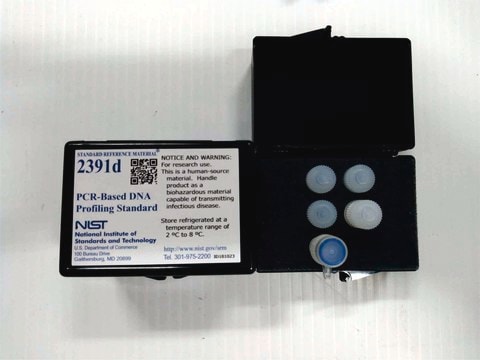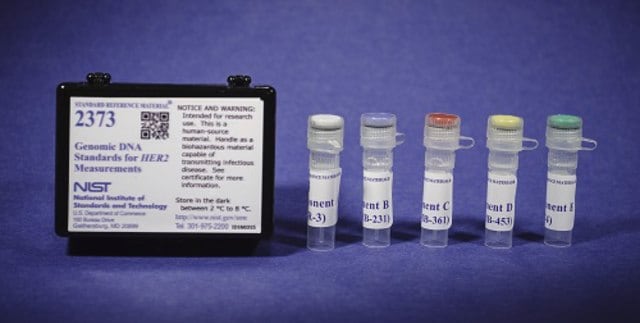NIST8392
Human DNA for Whole-Genome Variant Assessment (Family Trio of Eastern European Ashkenazi Jewish Ancestry) (HG-002, HG-003, HG-004)
NIST®SRM®
Synonyme(s) :
Human DNA for Variant Calling (Ashkenazi Jewish) (HG-002, HG-003, HG-004)
Se connecterpour consulter vos tarifs contractuels et ceux de votre entreprise/organisme
About This Item
Code UNSPSC :
41116107
Nomenclature NACRES :
NA.24
Produits recommandés
Forme
liquid
Conditionnement
pkg of 10 μg (3 vials)
Fabricant/nom de marque
NIST®
Application(s)
genomic analysis
Température de stockage
−20°C
Description générale
Human DNA for Whole-Genome Variant Assessment Reference Material (RM) is intended for validation, optimization, and process evaluation purposes. It consists of three human whole genome samples from a son-father-mother family trio of Eastern European Ashkenazi Jewish ancestry from the Personal Genome Project (IDs huAA53E0, hu6E4515, and hu8E87A9). A unit of RM 8392 consists of three vials containing human genomic DNA from a specific family member; extracted from three large growths of human lymphoblastoid cell lines from the Coriell Institute for Medical Research (Camden, NJ): GM24385 (son) labeled as HG-002, GM24149 (father) labeled as HG-003, and GM24143 (mother) labeled as HG-004. Each vial contains approximately 10 µg of genomic DNA, and the DNA is in TE buffer (10 mM TRIS, 1 mM EDTA, pH 8.0)
SRM 8392_cert
SRM 8392_SDS
SRM 8392_cert
SRM 8392_SDS
Application
Human DNA for Whole-Genome Variant Assessment Reference Material is intended for assessing the performance of human genome sequencing variant calling by obtaining estimates of true positives, false positives, and false negatives. Sequencing applications could include:
- whole genome sequencing
- whole exome sequencing
- targeted sequencing such as gene panels
Caractéristiques et avantages
- This reference material contains isolated DNA rather than live cells and is intended for research use.
- An extensive report of the investigation is available through NIST
- Information values are provided for single nucleotide variations (SNVs), small insertions and deletions (indels), and homozygous reference genotypes.
Autres remarques
- RM 8392 is stored at –20 °C at NIST but will be shipped in freezer packs and may not arrive frozen.
- Details on expiration, storage, safety, usage, and source are provided in the NIST certificate.
- Information on biomaterials, disposal, and transport is available in the SDS.
- he size distributions are measured using PFGE, and biases of this method were not characterized.
Informations légales
NIST is a registered trademark of National Institute of Standards and Technology
SRM is a registered trademark of National Institute of Standards and Technology
Code de la classe de stockage
12 - Non Combustible Liquids
Classe de danger pour l'eau (WGK)
WGK 1
Point d'éclair (°F)
Not applicable
Point d'éclair (°C)
Not applicable
Choose from one of the most recent versions:
Certificats d'analyse (COA)
Lot/Batch Number
Sorry, we don't have COAs for this product available online at this time.
If you need assistance, please contact Service Clients
Déjà en possession de ce produit ?
Retrouvez la documentation relative aux produits que vous avez récemment achetés dans la Bibliothèque de documents.
Determining Performance Metrics for Targeted Next-Generation Sequencing Panels Using Reference Materials
Cleveland MH, et al.
The Journal of Molecular Diagnostics : JMD, 20, 583-590 (2018)
Bennett O V Shum et al.
The Journal of molecular diagnostics : JMD, 19(4), 602-612 (2017-05-16)
The sensitivity and specificity of next-generation sequencing laboratory developed tests (LDTs) are typically determined by an analyte-specific approach. Analyte-specific validations use disease-specific controls to assess an LDT's ability to detect known pathogenic variants. Alternatively, a methods-based approach can be used
Notre équipe de scientifiques dispose d'une expérience dans tous les secteurs de la recherche, notamment en sciences de la vie, science des matériaux, synthèse chimique, chromatographie, analyse et dans de nombreux autres domaines..
Contacter notre Service technique



